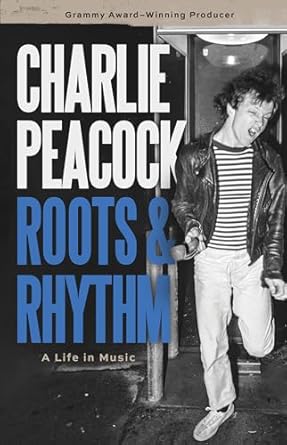THE READING ROOM: Charlie Peacock’s Memoir ‘Roots & Rhythm: A Life in Music’ is Both Literary and Engaging

Many years ago, a friend of Charlie Peacock’s daughter Molly came to visit her. She noticed the records hanging on the wall and a few trophies displayed here and there and asked Molly, “Is you dad famous?” Molly replied, “No. Just well-known.” As a Grammy-Award winning producer who’s worked with Amy Grant, the Lone Bellow, Holly Williams, Peacock is a little more than well-known, of course, though for many readers and music fans, he may not be a household name. In addition, Peacock is a songwriter whose credits include Grant’s “Every Heartbeat” and DC Talk’s “In the Light,” and he continues to release his own albums, most recently, last year’s Every-Kind of Uh Oh, produced by his son, Sam Ashworth (himself a Grammy-nominated songwriter and producer). Peacock has also won the Gospel Music Association’s Producer of the Year award three times, and he founded and developed the commercial music program at Lipscomb University in Nashville. In his new eloquent memoir, Roots & Rhythm: A Life in Music (Eerdmans, February 4), Peacock lets readers into his life a little more.
Peacock knows how to tell a story. “I was gifted with a childhood defined by dirt,” he writes in the book’s opening line. The good earth that grounded Peacock provided the soil in which his roots sank deep and out of which grew a family tree and a thriving life. With a graceful flourish, much like poet and essayist Wendell Berry, Peacock develops this metaphor in the book’s elegant opening pages, which themselves are worth the price of admission: “This book is about one artistic life rooted in America’s soil, shame, and success. A life planted in the Northern California farm town of Yuba City and bent on surviving anywhere, including Nashville, Tennessee…they shaped the fruit of my life. In fact, the soil of soul, place, and past shaped me before I could offer permission, awareness, and appreciation at all.”
Roots & Rhythm doesn’t proceed chronologically, but the memoir moves in concentric circles in which Peacock’s family roots and his many relationships with his friends, co-writers, and fellow musicians overlap. Peacock’s memoir differs from other music memoirs because Peacock doesn’t focus on the glory of his own accomplishments, but he makes sure to open his arms wide to include everyone involved in various chapters of his life. In the late 1980s, Peacock and his family moved from Sacramento, California to Nashville. He acknowledges that Sacramento was the exact place he needed to be to start his music career, for he met a number of other musicians and people in music industry who not only became friends but who also introduced him into wider circles in the music business. Yet, when he moved to Nashville, he’s astonished by how quickly the music world in Nashville opened up.
Peacock develops a theory about the ways people develop relationships that sustain them and in which each partner flourishes. He theorizes that we all enter into “circles of affirmation.” “Peel back the veneer on the career of every gifted and successful musician, and you’ll find a set of circles,” he writes. “The circle is a community of people that the musician must dwell in, be affirmed by, and pass through before moving to the next. The collection of circles is the sequence of people and events that confirms that the musician is on the right path; that the musician’s music dream is not only possible but probable.”
At least one of the circles through which Peacock traveled was his work with Holly Williams, the granddaughter of Hank Williams. In January 2012, he approached Jackson Browne’s manager, Cree Miller, asking if Browne might be like to be a guest vocalist on Williams’ album, which Peacock was producing. Browne agreed and joined Williams in the studio to work on a particular song. At the start of the collaboration, Browne’s contributions weren’t exactly what Peacock had hoped for, but after Peacock sang back his idea to Browne, he got it immediately and finished the song. Gwyneth Paltrow’s participation in the same session didn’t go quite so well, and Peacock learns—as his session guitarist Jerry McPherson points out—“music is hard.”
Peacock’s memoir doubles as his spiritual autobiography, and he candidly shares his struggles with faith and the journey on which he continues to travel. He writes that at “twenty-five years old, all my best efforts had failed, I was exhausted and in turmoil. I had deconstructed all obligations to family and friends—certainly to institutions. I had used everyone in my life for personal pleasure, ego, and gain.” Although he attended a recovery group, who impressed upon him that sobriety came through belief in a higher power. He sets off on a quest to find a higher power who will aid him, and he’s at first attracted to John Coltrane’s method of creating a pantheon by choosing from aspects of all religions. In the end, though, Peacock discovers that “transcendence as I understood it was not what I needed anyway. I needed real-time, earthbound rescue. I needed forgiving, reconciling, restorative love.” From that moment, he never turns back from “following Jesus in the way of love,” and his grace toward others and his ability to forgive others is evident in the stories Peacock shares with readers.
In the end, Peacock concludes, “there is so much goodness in music. Goodness from the Creator, who has brought it into being, goodness from the blessed ones who make it, and goodness from those who receive it and pass on the story of the music, neighbor to neighbor. This is why I made the music. And why I will always make it.”
Roots & Rhythm introduces Charlie Peacock and his life and work to a broader audience, and the memoir possesses a rare quality for a music memoir: it has a high literary quality to it that’s at once engaging and revealing.


